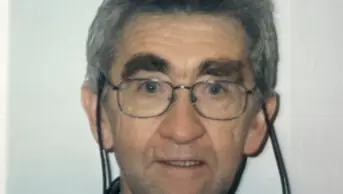On 8 January 2024, Eunice Isabel Anne Parker, aged 99 years. Ms Parker was a former member of the Society.
Tribute
Eunice Parker (née O’Sullivan) had a habit of breaking conventions. Not only did she become one of Britain’s leading pharmacists, but qualified at a time when 90% of the profession was male — she also drove to work on a Lambretta scooter decades before they became fashionable. Unwaveringly positive and fiercely independent, Eunice’s success was drawn from her conviction that she could achieve whatever she wanted. She was, in other words, the perfect inspiration for young women hoping to become scientists.
Eunice’s father, after seeing how his sister was forced to give up her life to care for their parents, was adamant that his two daughters would each have careers and not be dependent on anyone. His first Dierdre, became a headteacher, and Eunice became chief pharmacist at the King Edward VII Hospital in Marylebone — one of the hospitals used by the Royal family.
Perhaps surprisingly, Eunice’s path to success started when she left school aged 16 years to join Boots the Chemist as an apprentice. She gave all her pay to her mother, who put it away so she could one day afford to go to Nottingham University, which was known as ‘Jesse Boot’s University’. There, Eunice studied for a diploma in pharmacy and qualified in 1945. She often spoke of having “the time of her life” at university, enjoying the attention that came with being one of the few women on campus.
After graduating, she worked for Boots in different parts of England and became a hospital pharmacist. In 1947, she married Donald Parker, a mechanical research engineer. Two years later, she gave birth to her first child, Hugh, but motherhood didn’t dent her ambition.
During the 1950s, Eunice moved to Leavesden Green Psychiatric Hospital, where she became known for driving into work on a Lambretta scooter. She had two more children: Barbara in 1951 and Sheila in 1952. Once again, she continued to balance her thriving career with family life. After a spell at Amersham General Hospital in Buckinghamshire, she landed the chief pharmacist job at King Edward VII Hospital in Marylebone, in the late 1960s. As a result, she met members of royalty — both in the hospital and when she attended one of the late Queen Mother’s garden parties. Despite her strong attachment to her Irish roots, she took great pride in her royal connections. Finally, after many years at the King Edward VII, she returned to the NHS and became chief pharmacist for Wexham Park Hospital in Berkshire and the surrounding area.
For Eunice, however, pursuing a successful career and raising family still wasn’t enough. While working full-time as a senior pharmacist, she also studied jewellery-making and even obtained a licence to buy gold so she could craft gold jewellery. She also made all her clothes throughout her life, designing and crafting beautiful suits, coats, evening dresses and everyday clothes.
As she entered her 60s, retirement was far from a priority for Eunice. Instead, she moved to Dorchester, Dorset, to work for various retail chemists. Finally, she became a locum in the surrounding area, only retiring as a pharmacist once she was into her 70s.
However, even then, she did not stop working. In Dorset, she became a volunteer guide at Parnham House, the site of Craftsmen in Wood, where Viscount Linley studied. When she moved to Hertfordshire in the 1990s, she joined the local community health trust as a trustee. A decade later, she became a guide at Lord Leycester Hospital after moving to Warwick.
Even in her 90s, she made clothes and toys for her great-grandchildren and local charity shops.
During her final decade, Eunice spent much of her time laughing, her infectious smile often the first thing you saw when she looked at you. And yet, until the end, she retained her power to wither with strong words anyone who deserved it. She was joyful but candid; tender-hearted but fair. Eunice leaves behind children, grandchildren, great-grandchildren, nieces, nephews and friends who miss her very much — as well as a legacy they will never forget.
Sheila Lewis
You may also be interested in
